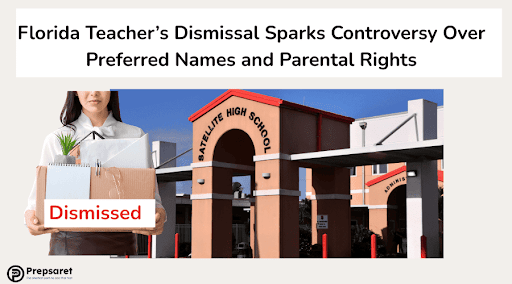A decision by Brevard County Public Schools in Florida not to renew a teacher’s contract has ignited a wave of protests and public debate over state laws governing student identity and parental authority.
Melissa Calhoun, a literature teacher at Satellite High School, was found to have used a student’s preferred name instead of their legal name without obtaining written consent from the student’s parents.
The school district said this action violated Florida law and district policy, which require parental approval for any deviation from a student’s legal name. Following an internal investigation, Calhoun received a formal reprimand and was informed that her annual teaching contract, set to expire in May, would not be renewed pending a review of her teaching license by the state.
According to Brevard Public Schools spokesperson Janet Murnaghan, the teacher admitted to knowingly disregarding the statute. “Teachers, like all employees, are expected to follow the law,” Murnaghan said. Florida’s Department of Education echoed this stance, stating that parents retain full rights over decisions concerning their children’s identity in educational settings.
Related Post: High School Diploma Vs GED
Community and Student Support Grows
The situation has drawn strong responses from students, parents, and education advocates. Supporters argue that Calhoun’s actions were grounded in compassion and connection with her students.
Over 26,000 individuals have signed an online petition demanding her reinstatement, describing her as “an advocate for respect and student rights.” Former students and community members praised her inclusive approach, suggesting her dismissal undermines trust and empathy in the classroom.
Student protests have also emerged. Dozens of Satellite High School students staged a walkout in support of Calhoun, expressing dismay at the district’s decision. “We truly are upset that we are losing such a positive teacher,” said sophomore Brianna Knight.
At a recent school board meeting, opinions remained divided. Some parents condemned the district for acting without transparency or providing Calhoun with a fair chance to respond. Kristine Staniec, a media specialist at the school, criticized the lack of explanation or opportunity for correction.
Others, however, backed the decision, citing the importance of upholding parental authority. Board member Katye Campbell emphasized that families, not schools, should lead decisions involving student identity.
The controversy centers on Florida’s Parental Rights in Education law, often referred to by critics as the “Don’t Say Gay” law. Originally passed in 2022 and later expanded, the legislation limits discussions on gender identity and mandates that schools obtain parental approval for use of names or pronouns that differ from those assigned at birth.
As the state reviews Calhoun’s teaching certification, the broader debate continues—balancing parental rights with inclusivity and respect in Florida’s classrooms.
Related: GED in Florida

